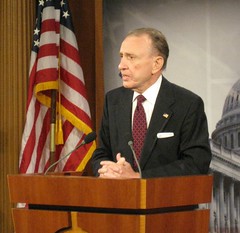Friday
Oct022009
Security Expert Warns That Hackers Could Destroy U.S. Money Supply
by Julianne LaJeunesse- University of New Mexico
The International Spy Museum in Washington, D.C. held a conference Friday calling for more public and private participation to stop internet "hackers."
At the conference, former U.S. director of the National Intelligence organization Mike McConnell said that internet hacking isn't a laughing matter, that instead, hacking could have a global effect.
"I'm not worried about someone, some hacker, turning off your refrigerator and spoiling tomorrow night's dinner," McConnell said. "I'm worried about some terrorist group that has the capability to attack the U.S. money supply."
McConnell said "destroying data, not stealing data" could have worldwide effects because it could contaminate the country's accounting system.
McConnell and other experts said public support through increased firewall use and knowledge about hacking could help decrease the number of "hack jobs" in the country.
James Lewis, director of the Technology and Public Policy Program at the Center for Strategic and International Studies, added that hacking includes spying. He said in the United States, like it or not, spying is a part of people's everyday internet use.
Lewis noted that current proposed legislation aims to provide more internet protections, but said as of now, spying and a weak U.S. defense toward hacking are "a big problem."
Controls such as Sen. John Rockefeller's (D-W.V.) proposed cyber security bill S.773 has drawn some support for its safety measures, but many people believe the potential of decreased internet access as granted by the President is a step too far.
The International Spy Museum in Washington, D.C. held a conference Friday calling for more public and private participation to stop internet "hackers."
At the conference, former U.S. director of the National Intelligence organization Mike McConnell said that internet hacking isn't a laughing matter, that instead, hacking could have a global effect.
"I'm not worried about someone, some hacker, turning off your refrigerator and spoiling tomorrow night's dinner," McConnell said. "I'm worried about some terrorist group that has the capability to attack the U.S. money supply."
McConnell said "destroying data, not stealing data" could have worldwide effects because it could contaminate the country's accounting system.
McConnell and other experts said public support through increased firewall use and knowledge about hacking could help decrease the number of "hack jobs" in the country.
James Lewis, director of the Technology and Public Policy Program at the Center for Strategic and International Studies, added that hacking includes spying. He said in the United States, like it or not, spying is a part of people's everyday internet use.
Lewis noted that current proposed legislation aims to provide more internet protections, but said as of now, spying and a weak U.S. defense toward hacking are "a big problem."
Controls such as Sen. John Rockefeller's (D-W.V.) proposed cyber security bill S.773 has drawn some support for its safety measures, but many people believe the potential of decreased internet access as granted by the President is a step too far.




 Friday, October 2, 2009 at 5:26PM
Friday, October 2, 2009 at 5:26PM

House Republican Urges Obama To Reject Lobbying Attempt From Sudan Government
U.S. Rep. Frank Wolf's (R-Va.) objection to a Sudan lobbyist presence in Washington, D.C. didn't find much of an audience Thursday, but the Congressman moved past the small crowd, calling on President Barack Obama to reject the Sudanese government's prospective representation at the Capitol.
"Today, I am sending a letter to President Obama urging him to make it clear, in no uncertain terms, to both the State Department and the Treasury Department's office of Foreign Assests Control, that under his administration, the government of Khartoum, will not be granted the necessary waiver to hire a lobbyist," Wolf said. "A modern day accused war criminal is sitting as a head of the state of government of Sudan."
Wolf noted Sudan President Omar al-Bashir's March 2009 arrest warrant issued by the International Criminal Court, and said in June 2004, he was part of a delegation of Congressmen who went to Sudan, where he witnessed what he described as "the nightmare."
When al-Bashir was issued an ICC warrant, the Sudan government said they did not recognize the ICC as a legitimate agency.
Wolf said new consideration of Sudanese representation in the nation's capital, "would be a disgrace and must not be permitted to take place under any circumstances."
The Sudan government has not been represented in Washington, D.C. for more than four years, largely due to what the U.S. government once said was genocide in the country's Darfur region.